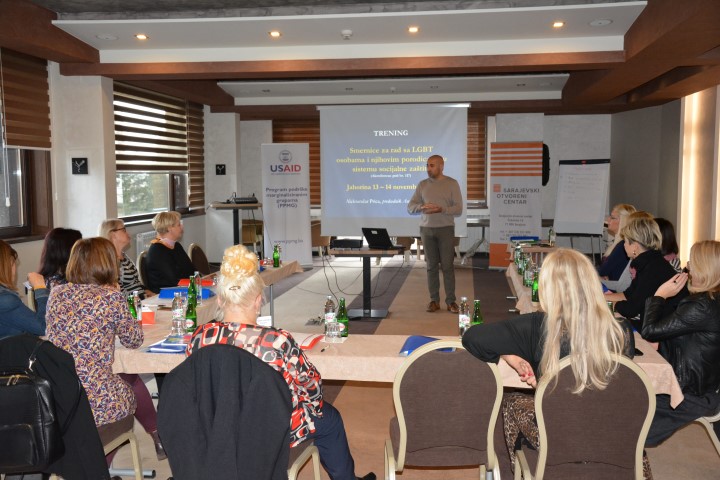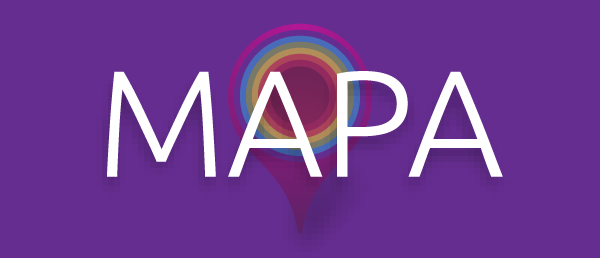 Sarajevo Open Centre, with the support of Marginalized Populations Support Activity in Bosnia and Herzegovina (USAID/PPMG), in the scope of the project „Building institutional networks of support for lesbian, gay, bisexual, transgender and intersex (LGBTI) persons in Canton Sarajevo“, organized the two-day training for the employees of the Cantonal Public Institution Center for Social Work and Gerontology Center Sarajevo, on 13 and 14 November 2017. This is the first time ever that Sarajevo Open Centre educated workers from the field of social protection of human rights of LGBTI persons.
Sarajevo Open Centre, with the support of Marginalized Populations Support Activity in Bosnia and Herzegovina (USAID/PPMG), in the scope of the project „Building institutional networks of support for lesbian, gay, bisexual, transgender and intersex (LGBTI) persons in Canton Sarajevo“, organized the two-day training for the employees of the Cantonal Public Institution Center for Social Work and Gerontology Center Sarajevo, on 13 and 14 November 2017. This is the first time ever that Sarajevo Open Centre educated workers from the field of social protection of human rights of LGBTI persons.
The two-day training dealt with human rights and better understanding of the issues lesbian, gay, bisexual, trans and intersex (LGBTI) persons face, named Guidelines for Working with LGBTI Persons and their families in the system of Social Protection.
On of the goals was to introduce specific guidelines that can be used in their professional work, in order for them to be more prepared and equipped for their further professional work and in order to know how to adequately work with LGBTI persons.
The education was led by Aleksandar Prica – the president of the Association Rainbow from Šabac, Serbia. During the first day of the education, social workers had the chance to listen and discuss through various sessions, interactive lectures and group work on the importance of terminology that is being used; short historical review; marginalized identities; LGBTI identities; issues and consequences that LGBTI persons and members of their families face; human library; guidelines and recommendations for work with LGBT persons and members of their families. At the end of the day, the social workers had the chance to listen and discuss on how to apply what they have learned in their everyday work. During the second day of the training, there was talk about the work with the parents of LGBTI persons, specifically the phases of the process of acceptance when their children come out to them, or when they find out they are LGBTI; about the prevention of violence against LGBTI persons; about potential social services that can be provided for LGBT persons.
The aim was for the social workers to understand some very important things:
- the ways in which the social stigmatization (manifested as prejudice, discrimination, violence) is a risk for the quality of life and wellbeing of LGBTI persons
- to understand how incorrect information about LGBTI persons, as well as attitudes based on prejudice, can affect their work with LGBTI persons and members of their families
- to understand the kinds of challenges LGBTI persons who are also parents face
- to recognize the fact that the families of LGBTI persons can include persons who are not legally or biologically connected
- to understand how homosexual or bisexual orientation can affect the family of that specific person and the relations within the family
The workers in the system of social protection received some specific recommendations on the things they should have in mind in their professional work regarding LGBTI persons:
- to educate themselves and sensitize on the specific problems LGBTI persons face
- to always emphasize confidentiality to their clients
- to always use adequate terminology
- to contact LGBTI organizations and cooperate with the NGO sector
- to never presuppose the emotional/sexual orientation of a person
- to ask the person who can be supportive (alternative family structures of LGBTI persons)
At the end of the training, all participants stated that the training was very useful, because they learned about the rights, problems and struggles LGBTI persons live with. They also pointed out the importance of the opportunity to meet some LGBTI persons. Some of the statements of the participants were: I consider these two days of training to be a gift. I learned many things I did not know and got the chance to review my own empathy. In the future there should be organized trainings like this one for our colleagues. These statements encouraged us to continue our work in this direction.





